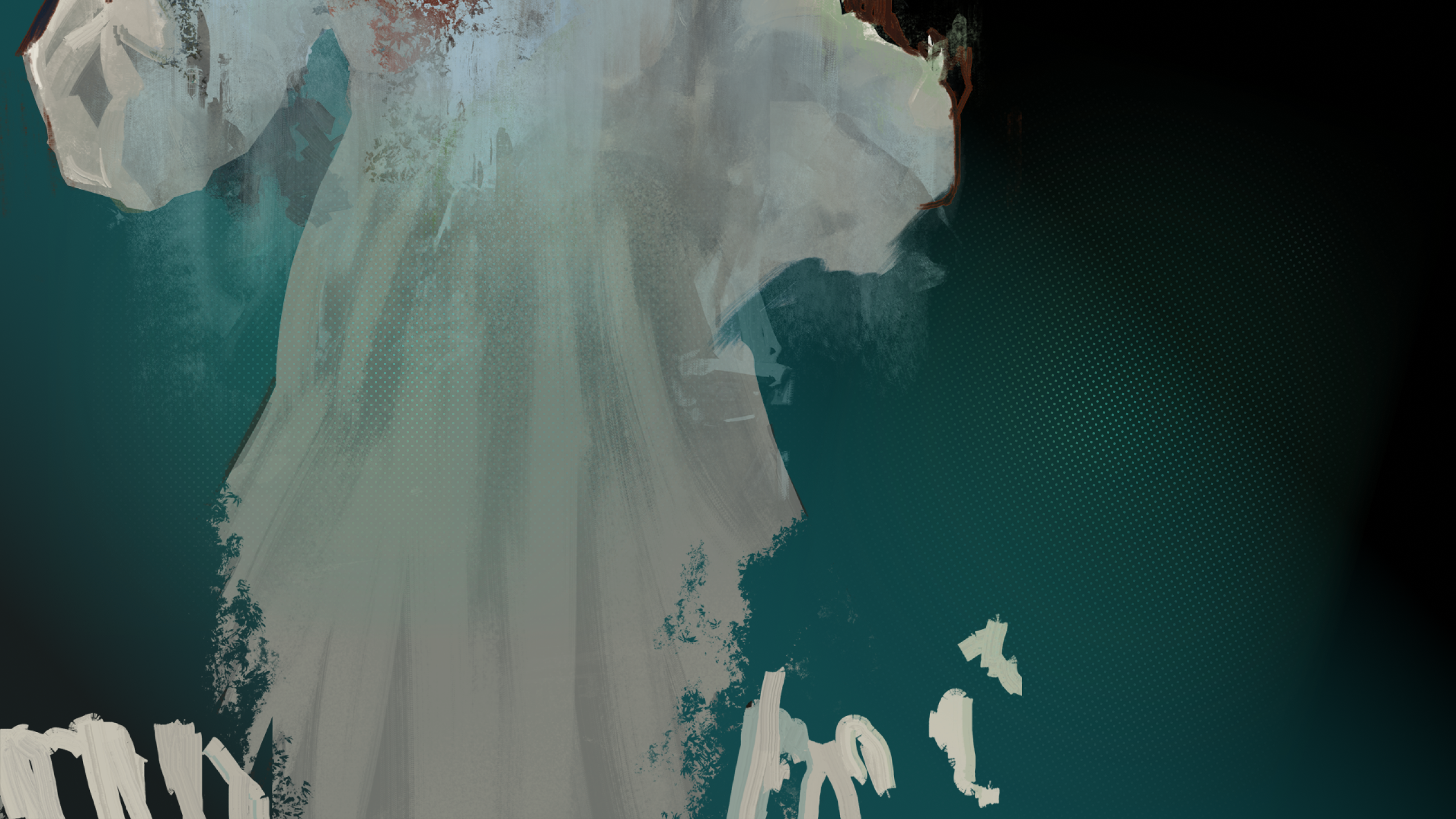Original article written by Izual and published in Canard PC. Translation by Steph Noviss. Thank you for giving us the opportunity to share this article with the world.
Back in 2015, strange rumours began wafting from Estonia like whispers in the wind. Whispers of a visionary role-playing game, an artists’ collective turned video game studio, a story featuring a blackout-drunk cop in a universe that’s totally new. With influences from Planescape: Torment and Kentucky Route Zero, the game which was then called No Truce With The Furies promised to change our relationship with narratives, dialogue, and role-playing. But did this game, developed in far-off Tallinn, even exist? Or were the official screenshots no more than a series of tantalising montages? A question mark remained for several years. And then, at the end of April, I boarded a train to meet with its creators and spent many hours playing it. Those whispers in the wind were not exaggerating: if anything, they should have been louder.

I’m a cop. I don’t know much more than that – probably because I woke up with amnesia, lying face down on a hotel room floor, still reeling from an apocalyptic bender the night before. I’m a cop – and I’m sure of that, because the people at the hotel don’t seem best pleased that my investigation is getting nowhere. What investigation? Well, I’m damned if I know, and I’m going to have to ask them, even though I have a feeling it will annoy them. I’m a cop, but I have ambition. A little voice in my head even said I was definitely a superstar, and that makes sense because superstars also pass out in their own vomit when they have too much to drink. So, when another hotel guest asks me my name, I tell them I’m the harbinger of doom. And there you have it – not even ten minutes since I started playing Disco Elysium and already I’ve created a character for myself. I should point out that, in this game, everything can be used as a tool to develop your relationship with the hero and take him in whatever direction you find interesting. You might choose a dialogue option because it makes you laugh, and you’re pretty sure things will then just move on – but the game grabs the opportunity, delves deeper into that superstar backstory, and stashes it away for future use. In my case, it will even ask whether I want to roll the dice to see if I can flash a winning smile.

Superstar in a funk. Obviously, this attempt will fail miserably. You see, the hero in Disco Elysium isn’t just a cop: he’s also a massive loser. The vomit on the hotel room floor is merely the first in a long series of grim revelations, from his ungainly physique and completely irresponsible behaviour to his truly awful taste in clothes. Not quite the energetic young adventurer you’d normally be playing in an RPG, but it’s no big deal. On the contrary, it’s actually better: this guy’s eccentricities force the player into a whole load of insane, unconventional situations. After a colourful conversation as I call the police station to report my lost badge, or perhaps it’s after I try to arrest the hotel manager to get out of paying for my room (a particularly unsettling scene), I realise the game has me hooked, convinced that this loser detective’s misadventures are worth more than a thousand medieval quests to save a village from bandits. Not just because these scenarios are so original, but also because every piece of dialogue in Disco Elysium is an absolute delight to read. With countless jokes that could elicit a hearty laugh even from my colleague Kahn Lusth on MOT day, situations you can push further and further into the ridiculous, and entertaining, multi-layered characters, these are conversations you will want to linger over for a long time rather than skimming through them.
ZA/UM is where the heart is. Very little information has filtered through about ZA/UM Studio since Disco Elysium was announced. I therefore took advantage of my meeting with a few of its team to reassure myself that they weren’t all just actors roped in by some wealthy corporation to set up a giant hoax, because, well, you do hear about that sort of thing on the internet… But no: Disco Elysium is definitely being developed by an Estonian artists’ collective who fantasised about starting a cultural movement back in the late 2000s. Doubtful as to whether it would take off in Estonia (a country with a small population of around a million and also a very conservative environment, where they felt very little sense of belonging), this group of poets, writers, sculptors and painters decided to turn their attention to English-speaking culture in 2014. Wanting to adapt the pen-and-paper role-playing game they had spent a decade working on into a video game, the collective recruited programmers and transformed themselves into a proper studio, complete with business hours, team meetings and a UK office. The transition was far from painless, but the developers’ soul remains intact: staff in the Brighton office are lucky enough to have a gold bust of Lenin casting a watchful eye over them as they work.

This loser detective’s misadventures are worth more than a thousand medieval quests to save a village from bandits.
The name of the prose. Quality like this didn’t happen all by itself. In the UK office of ZA/UM (pronounced “Zowm”), near Brighton beach, I had a long chat with Robert Kurvitz, Disco Elysium’s lead designer and lead writer – an Estonian native who has what he himself describes as an unreasonable degree of perfectionism. Even the place names in the game took a ridiculous amount of work: as Kurvitz explains, “Paris, Berlin, London… All these names have evolved over thousands of years. We as humans have adapted and refined them to a point that goes beyond comprehension. This is why our place names have to be excellent too, otherwise I wouldn’t find them credible myself.” I didn’t dare point out the existence of places like Cockermouth and Lickfold, proof that human beings don’t always think things through – I was already sold on the Disco Elysium universe. Admittedly, the game could hardly have left me cold and indifferent, with its isometric viewpoint in 3D and stunning graphics reminiscent of an oil painting complete with brushstrokes showing through. But best of all is the fact that the game’s contemporary society, unpredictable climate and industrial-meets-rustic backdrops make you feel as if you’ve stepped into a sleepy coastal resort somewhere by the Baltic Sea. The vast city of Revachol is not, however, any place on Earth – you can tell by the deliciously retro technology, the strong French influences (the game starts in a harbour area called Martinaise) and a history that is just familiar enough to spark curiosity. “I wanted to create a world for people who have more or less run out of interesting history articles to read on Wikipedia,” says Kurvitz.
Text appeal. Fittingly, the multi-layered, intriguing history of this universe is not explained to the player through the usual lore dumps1, but instead comes through in snatches and fragments, which is infinitely preferable. Those particularly hungry for information could always spend a few points on the “encyclopedia” skill, which will interrupt the dialogue to bring you an impassioned history lesson – but there are so many other enticing skills available that you’ll find yourself faced with a real dilemma. Where other RPGs would normally use just three or four skills (at most) to influence dialogue, here you have a whopping twenty-four. And all of them are useful, desirable, and smart – so much so that I sat looking at the character customisation screen for a good few minutes, unable to choose between a sixth sense, an ability to lie, or hand/eye coordination: a fiendishly difficult decision.

A festival of warped thinking, joking and role-playing which always goes one step beyond what you expected.
The human condition. What I found craziest is that these skills do more than just unlock frivolous dialogue options. Although they are sometimes used for dice rolls (“composure”, for example, will help stop you from passing out like a sack of potatoes when you have to remove a hanged cadaver while your partner looks on in dismay), their usefulness lies mostly in their ability to butt in on your conversations, as though they were characters in their own right. “It’s as if there were 24 people having a big party inside the hero’s body,” says Kurvitz. “By distributing points, you can vote to decide which ones get the most power.” What power? The power to give our hero questionable advice while he’s mid-conversation, the power to roast him, or the power to try and lead him in another direction. “Endurance” is one skill that voices itself particularly crudely, from the depths of the hero’s gut: it gave me grief for a good five minutes, trying to turn me into some kind of macho halfwit obsessed with the idea of sending women back into the kitchen.

Off the beaten pacifism. Yes, it went on for a good five minutes – a dialogue in Disco Elysium can easily take a quarter of an hour. This would seem an eternity in any other RPG but in this game it flies by, precisely because these conversations are never just straightforward question-and-answer exchanges. What with the different skills chatting away, the slippery customers you have to interrogate, the hero making pathetic attempts to outdo everyone else the whole time, and the game’s unique responsiveness, every discussion feels more like a festival of warped thinking, joking and role-playing which always goes one step beyond the detective game you were expecting. And I’ve not yet mentioned the “Thought Cabinet” – this is a screen that lets you tap into the hero’s recurring thoughts (such as becoming a superstar), which can change over time to generate powerful bonuses. Before visiting the studio, I was of course concerned about the lack of traditional combat sequences. For the last ten years, dialogue in RPGs has existed merely as a filler or to serve a specific purpose (take up a mission, find information about the mission, conclude the mission), so I would have been within my rights to panic at the idea of a game where dialogue is everything.

Comes the resurrection. However, Disco Elysium not only has some combat sequences (with a highly promising sort of turn-based system that progresses through dialogue, which means it can, and I quote, “describe precisely how much it hurts to take a bullet to the pelvis”), but the in-game text is more than enough to bring a sense of rhythm, freshness, powerful emotion, and originality to the adventure. The urge to whip out a gun and zap all the bad guys becomes immediately less pressing when every conversation turns out to be a fast-paced confrontation of rhetoric, a wrestle with a hideous tie, or a battle of wills with a merciless twelve-year-old (who stands a pretty good chance against our hero). It may not seem like a big deal, but when you combine it with a highly original universe and impeccable writing, this polyphonic, dynamic system of dialogue will most likely produce a game light years ahead of the RPGs we know. And if Disco Elysium does well after its release at the end of the year, it’s going to be mighty hard for studios to carry on releasing old-style RPGs as if nothing had happened. What is clear is that there’s a real storm brewing in that whispering wind from Estonia.
See you next week for PART 2 – the interview with Robert Kurvitz!



